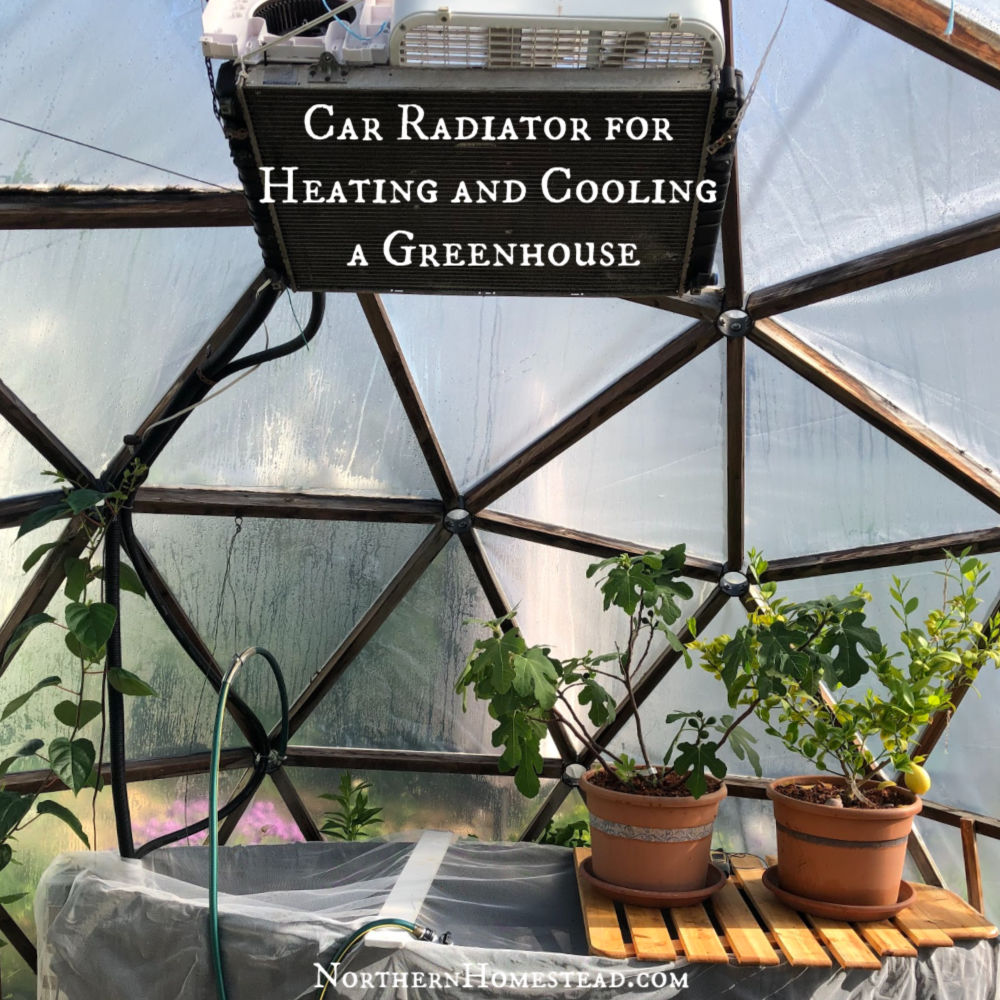
After using a car radiator for heating and cooling a greenhouse for many years now, we thought it is time for an update.
To control the temperature in our Geodesic Dome greenhouse, we used a Water Tank for passive temperature regulation and also an old car radiator for active heat exchange. Using a gas or electric heater can be costly. This recycled car radiator did the trick for us.
Note: Here we share the idea, it is not a complete how-to. The idea is for tinkerers :). If you are one of them, you will appreciate this article, if you are not, just note that there is this possibility or become a tinkerer.
How does the Car Radiator Heating and Cooling work
A greenhouse can get very hot during sunny days. To cool it down you can add ventilation using automatic window openers, and shade cloth. That’s how we started, too.
Our climate’s uniqueness is the cool nights. It is not unusual to have just 8 °C (46 °F) at night in the middle of summer and even cooler in spring and fall, which is too cold for heat-loving plants. We wanted to find a way to store the excess heat during the day to heat the greenhouse during the night.
The radiator heating and cooling system’s simple heat exchanger absorbs the heat energy from the air during the day and stores it in water, at night it gives that heat back to the ambient air in the greenhouse.
Simply said, whenever the water is cooler than the air it cools and when it’s warmer it heats.
Since we already had a water tank as thermal mass and a pump to filter the water, all that was needed was to connect the radiator in sequence after the filter. So the water would be pumped through the radiator after being filtered and then flow back into the tank.
The radiator works in a very simple but effective way. Note that a filter is not needed for the system to work. The filter is there for the water quality in the tank.
The heating and cooling do not work if day and night temperature is about the same with no sun to warm up the greenhouse. During longer periods of overcast cold weather, we have to add supplemental heat to the greenhouse. We have done both, adding some hot water to the water tank or just adding a heater to the greenhouse.
Since we usually get many sun hours, the system works great for us most of the time.
Materials Needed for a Radiator Heating and Cooling System
- 1/4 HP submersible utility pump
- Car radiator (cleaned)
- Hose
- Electric wiring with a switch
- Fan (if not attached to the radiator)
Installing the Radiator Heating and Cooling System
Car radiators come in different sizes and shapes. Choose one according to the size of the greenhouse and water tank.
For our first greenhouse, we had a radiator from an old van with the original dual fan unit already attached. I installed it above the water tank. No, it’s not really a beautiful piece in the greenhouse, but the functionality outweighs that by far.
In the current greenhouse, we use a radiator from a full-size sedan which is a bit overkill but that’s what I had available. It did not come with a fan, so we added one on top. First I installed it in the middle of the greenhouse, it worked great as for the airflow and was somewhat out of sight.
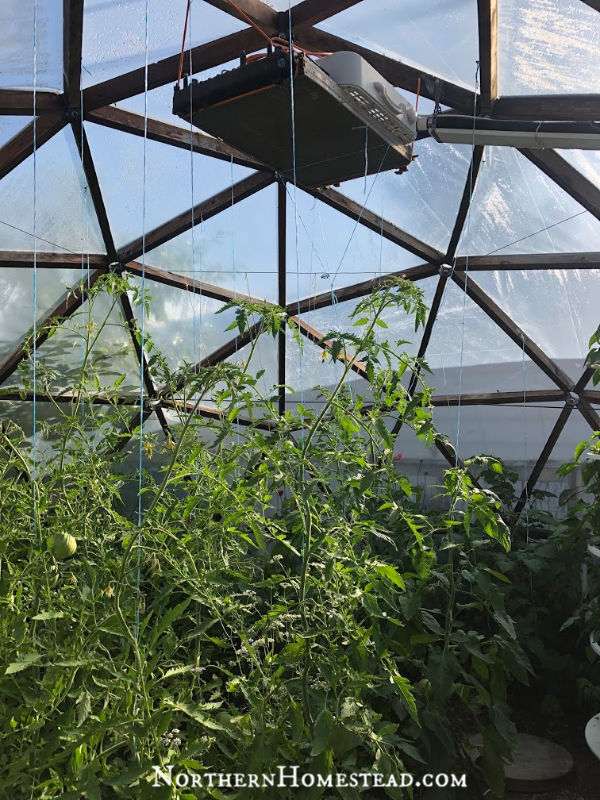
However, we noticed that the plants underneath were shaded, and also lots of debris was accumulating on the radiator blocking the airflow. So I moved the radiator to the north side above the tank, but this time higher and again at an angle. It seems to work optimally and also looks exceptionally.
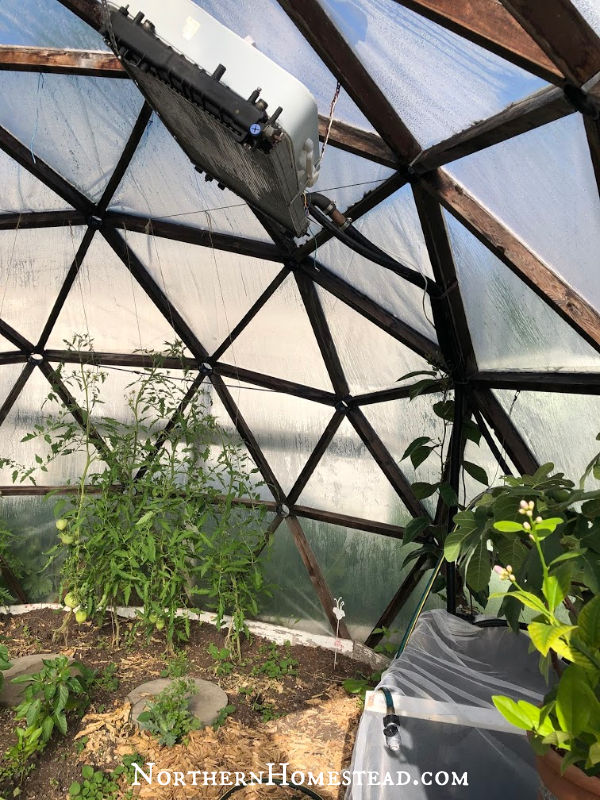
I even installed an air to air intercooler in our indoor garden room, it really is just about a 1×1 ft radiator, but it still pushes lots of air through, too.
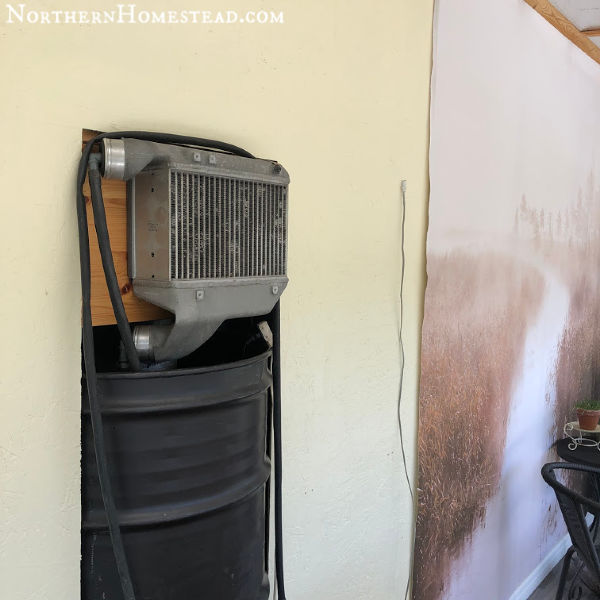
Once the radiator is in place it needs to be connected with a hose to the water pump in the tank so water can circulate through the radiator. Make sure to use a cleaned radiator, otherwise, the water in the tank will get very dirty.
If the radiator does not come with a fan, attach a fan on top of the radiator so it pushes the air true the radiator creating the heating or cooling effect. We find that a flat classic floor fan works best.
Car radiator heating and cooling system in action
Here is a video that we made on a cool spring morning. The indoor and outdoor temperature difference is significant, but still according to the temperature of the water. It was 4 C (39F) outside and 13 C (55F) in the greenhouse, the water was 15 C (59F).
If you can’t see the video go here.
After seeing how well the system works in our first dome, we did not install any windows in our second dome. We wanted to store all the heat we get in the water. It works amazingly well even without any ventilation besides the door.
The car radiator heating and cooling system allows us to start a few weeks earlier in spring, spring start is more dependent on soil temperature than air. In the fall we can prolong the season 1-2 months, till the temperature drops to -10C (14F).
Questions and Answers:
Q. With the radiator in there, can you continue to keep the frost out during the winter?
A. We can not, we are in zone 3, our winter temperature goes as low as -40 degrees. Depending on how cold it gets in your area in the winter you might be able to run the greenhouse through the winter. The radiator in combination with the water tank does not produce any heat by itself, it is just storing the heat in the water. It works very well in a plastic covered greenhouse till outside night temperatures drop to about -10C (14F), if it gets lower than that there is a danger of water freezing in the tank and potentially damaging the system.
Q. Will this work during a cold and overcast period?
A. This active heat exchange only works in combination with solar energy. On cloudy days there might be not enough heat to hold through a freezing night. A supplemental heater will be needed.
Q. Could you use solar panels or a solar heater to heat the water during the day?
A. You could heat the water in the winter with some kind of aquarium heater using solar energy or even a solar heat collector to heat water during the day. Except there might not be enough daylight in the winter.
We invite you to subscribe to Northern Homestead and follow us on Instagram, Facebook, or Pinterest for the latest updates.

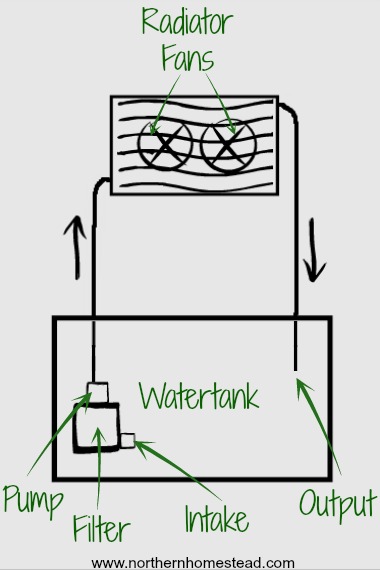
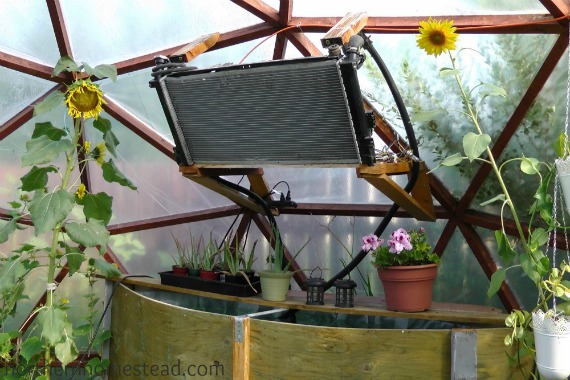

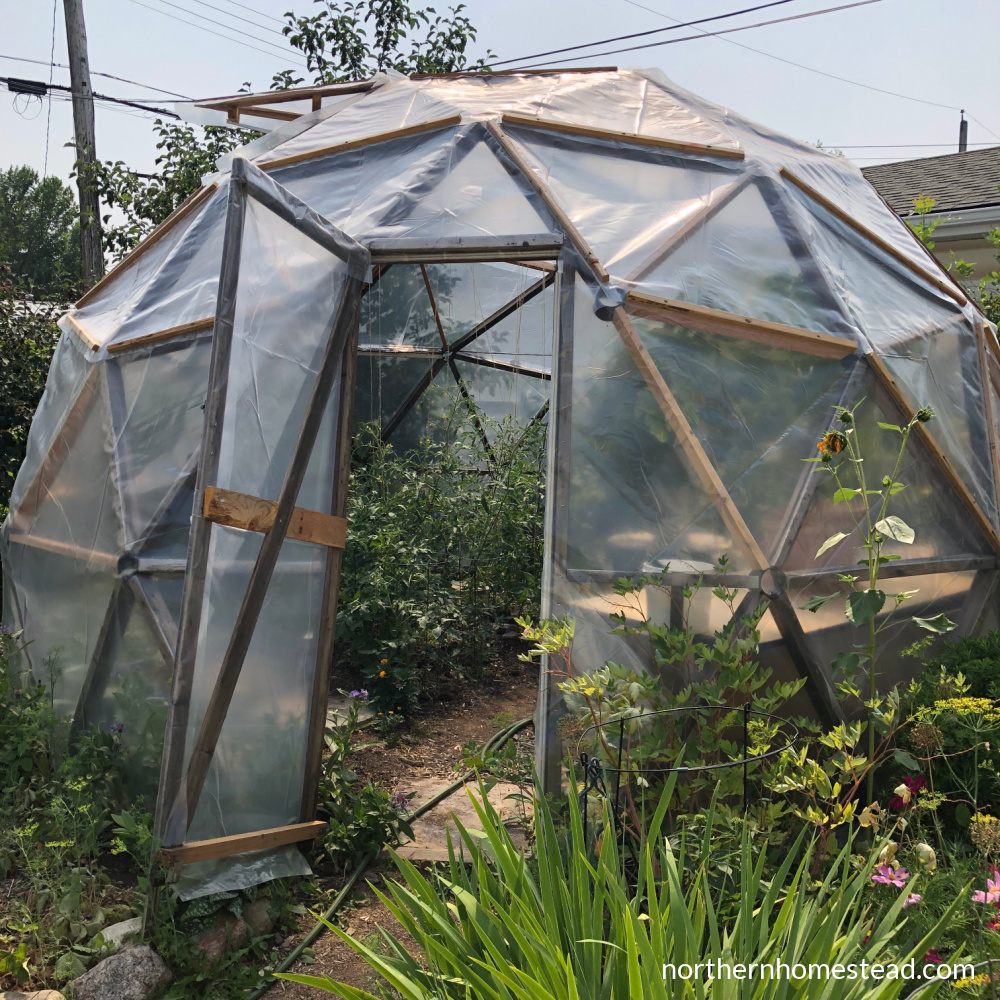
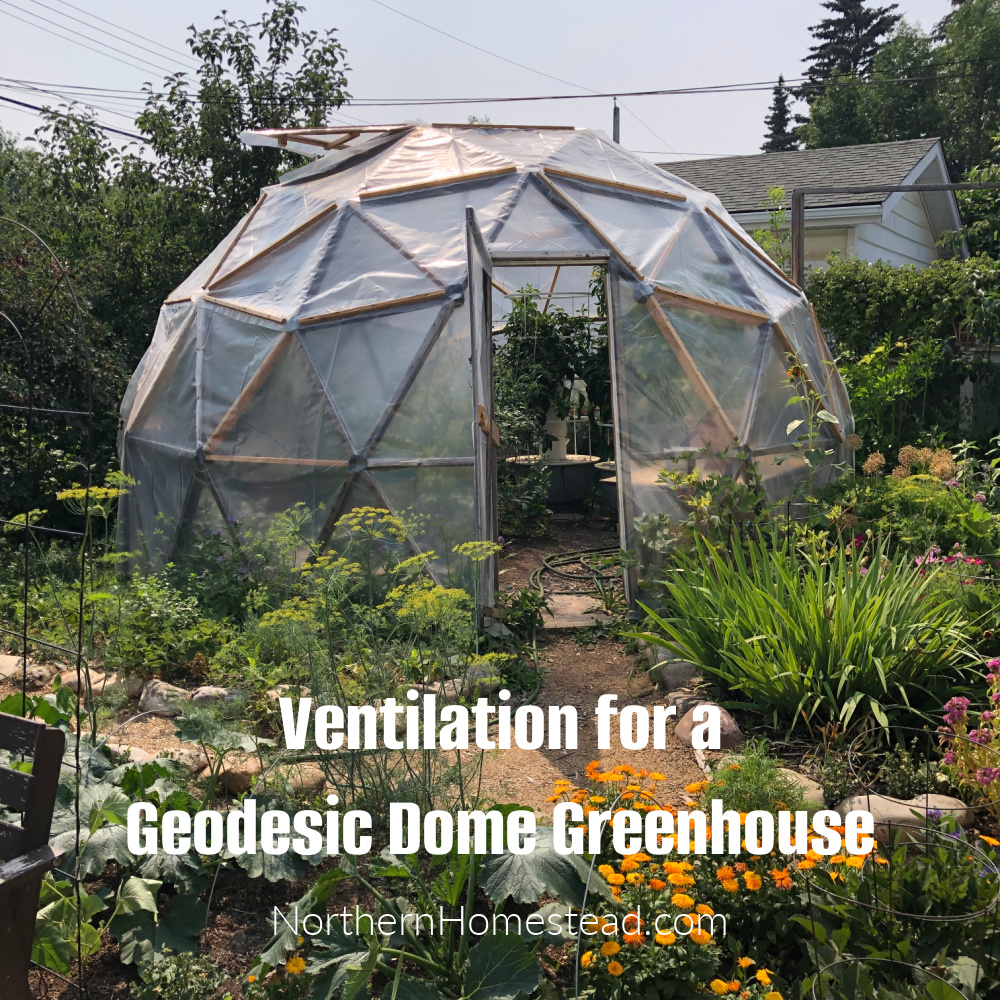
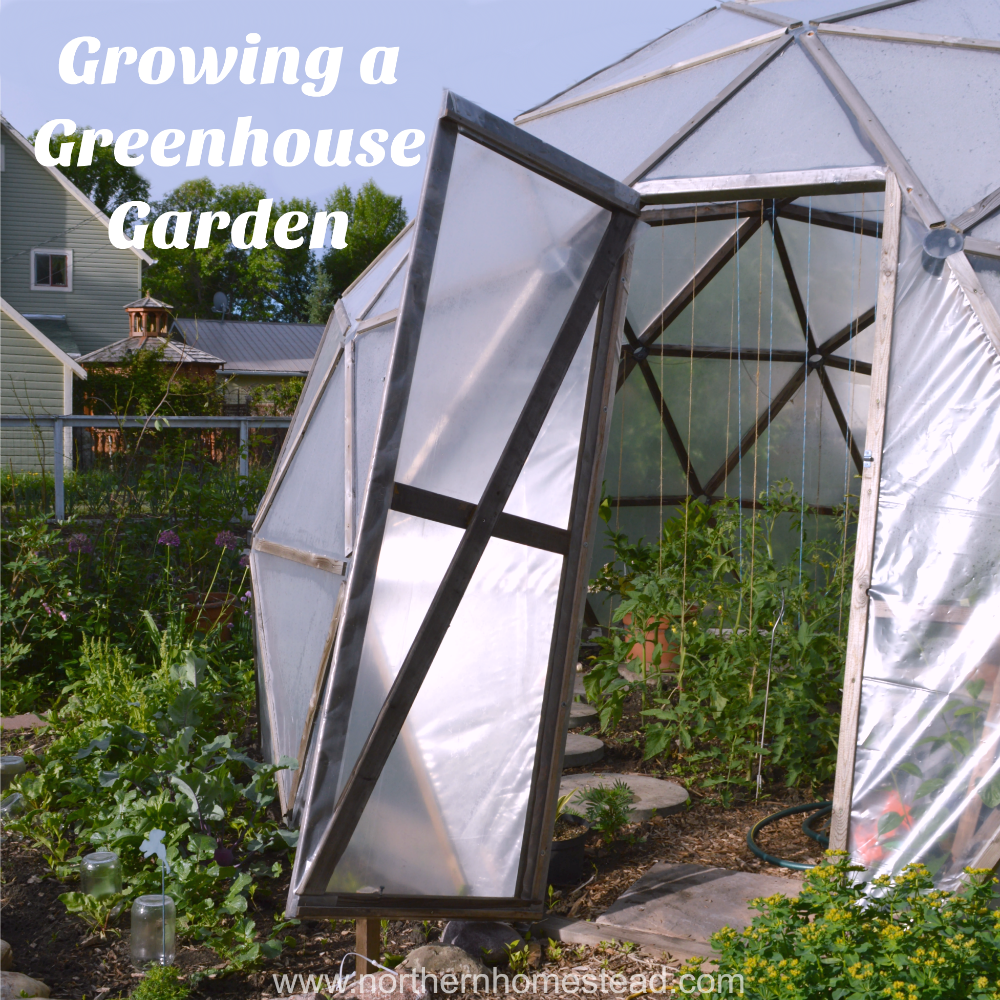
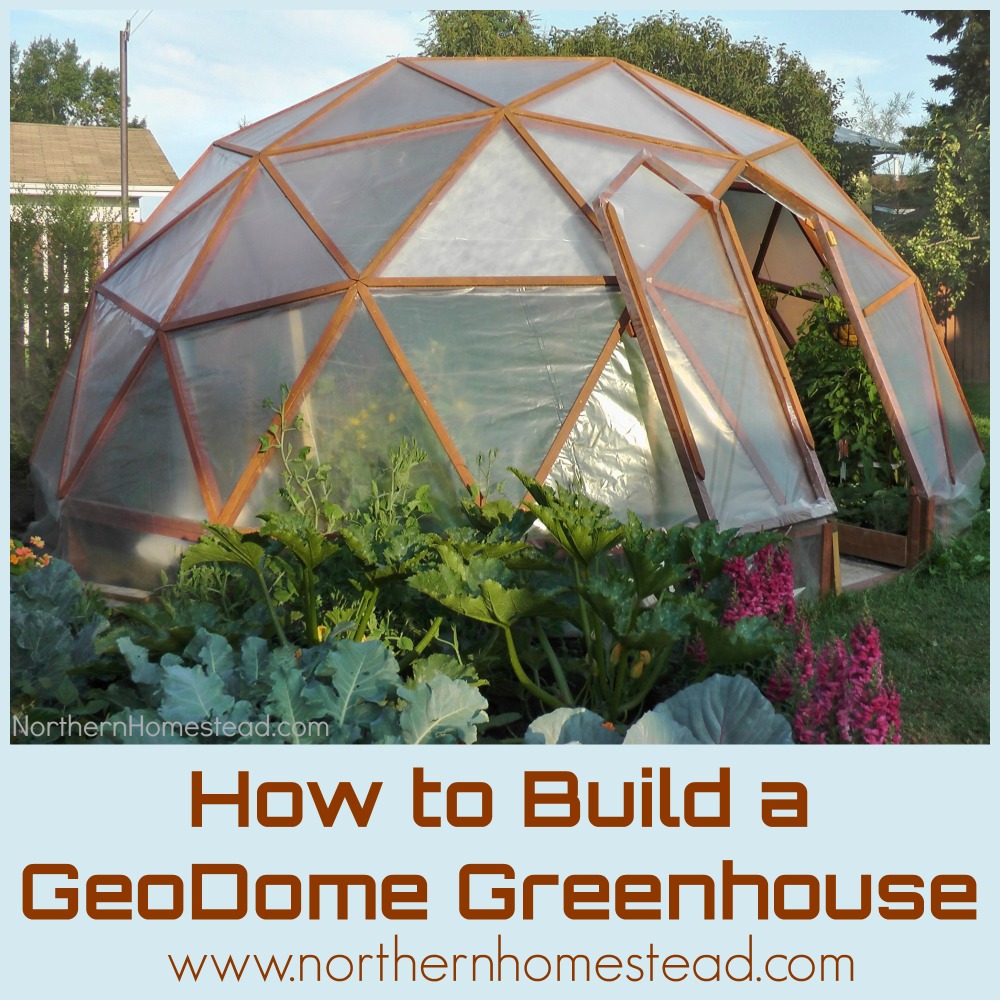
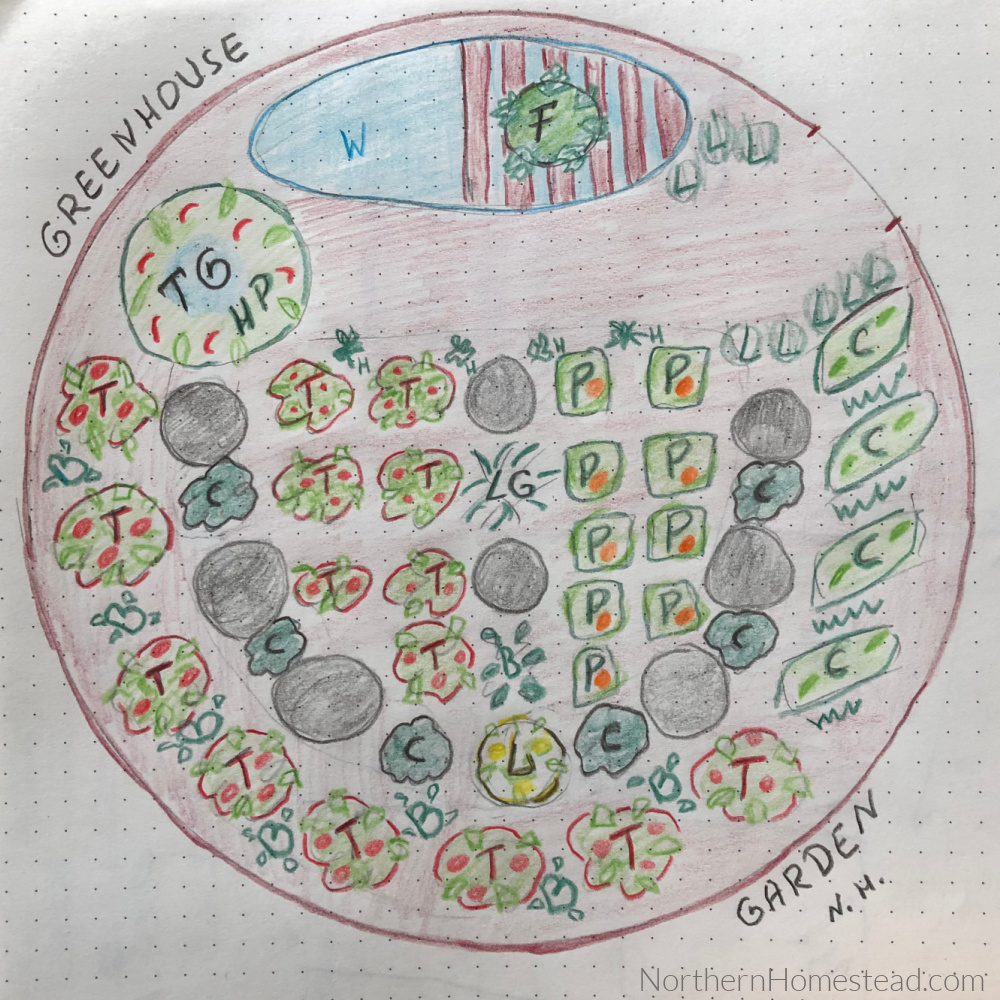
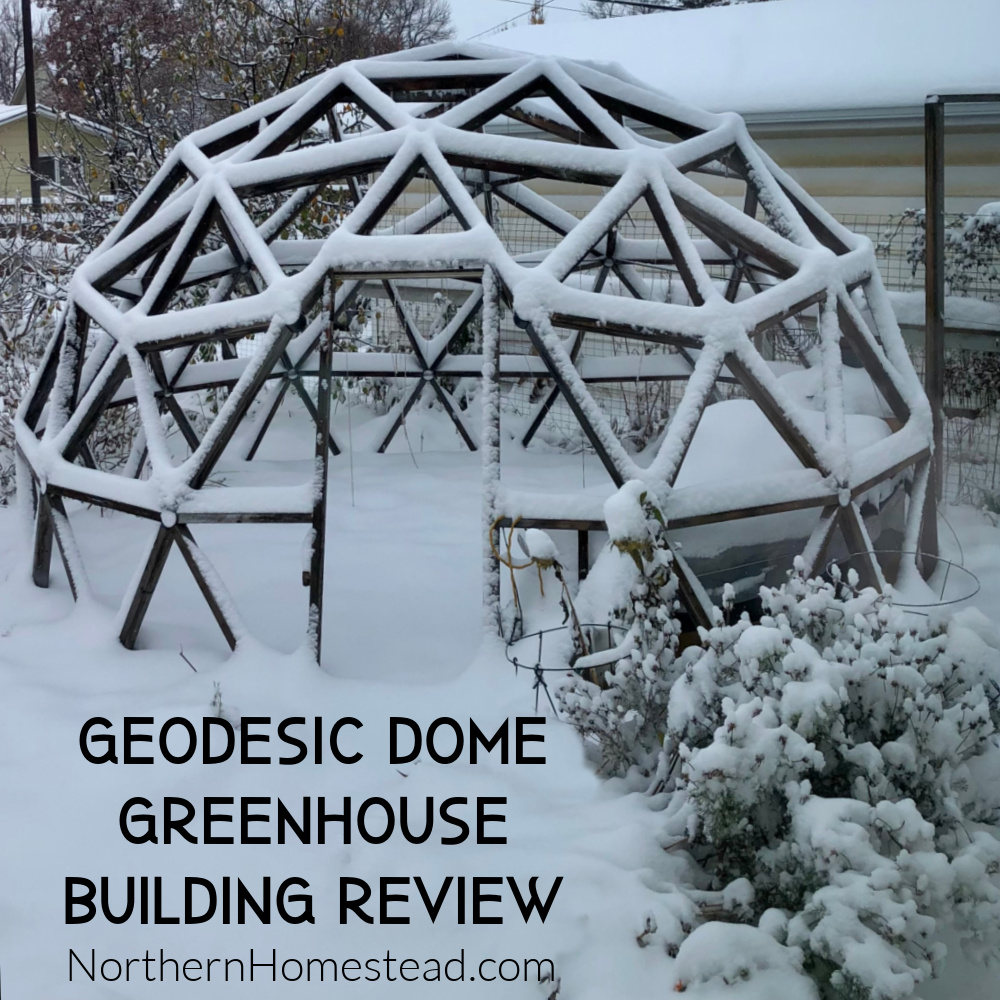
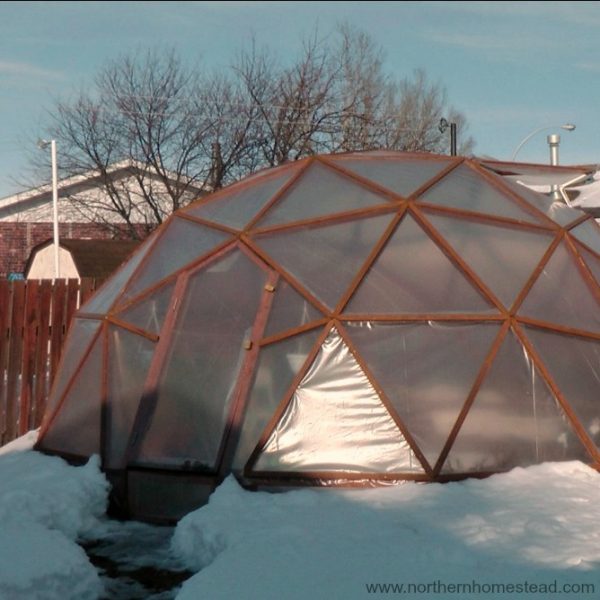
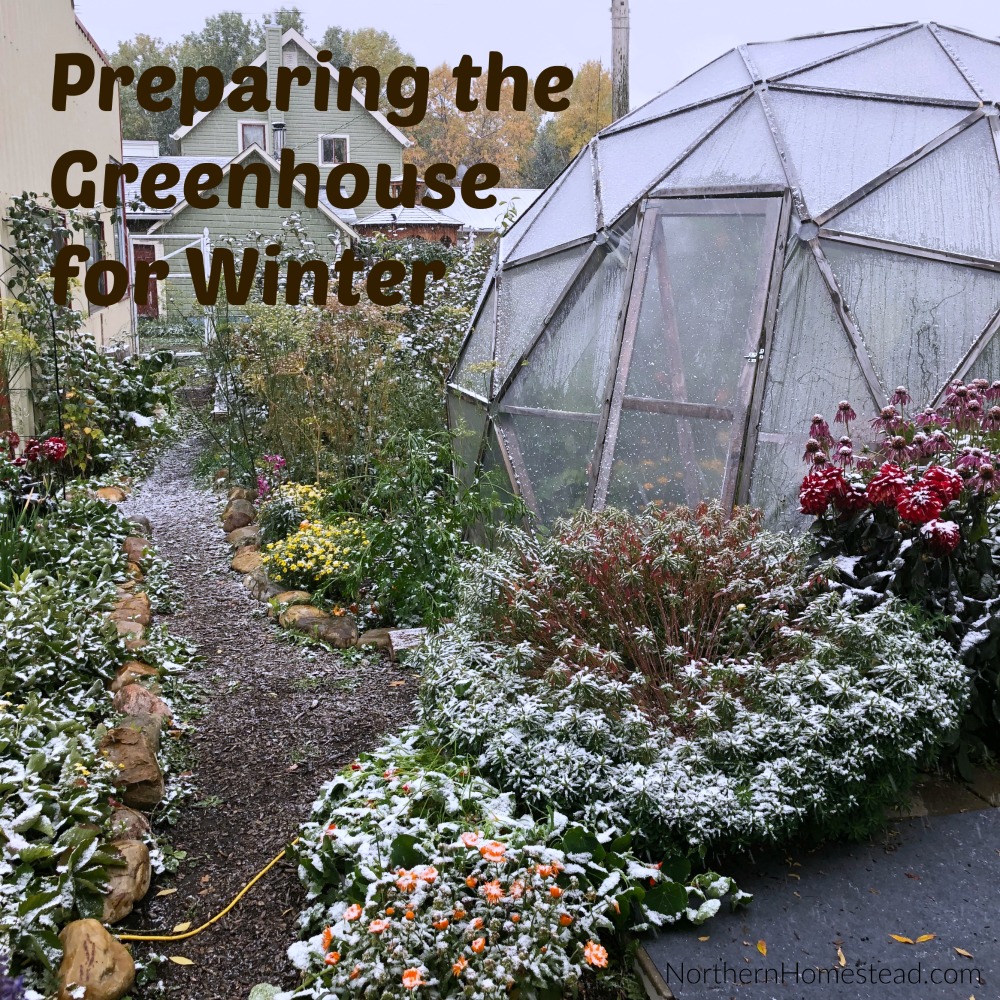
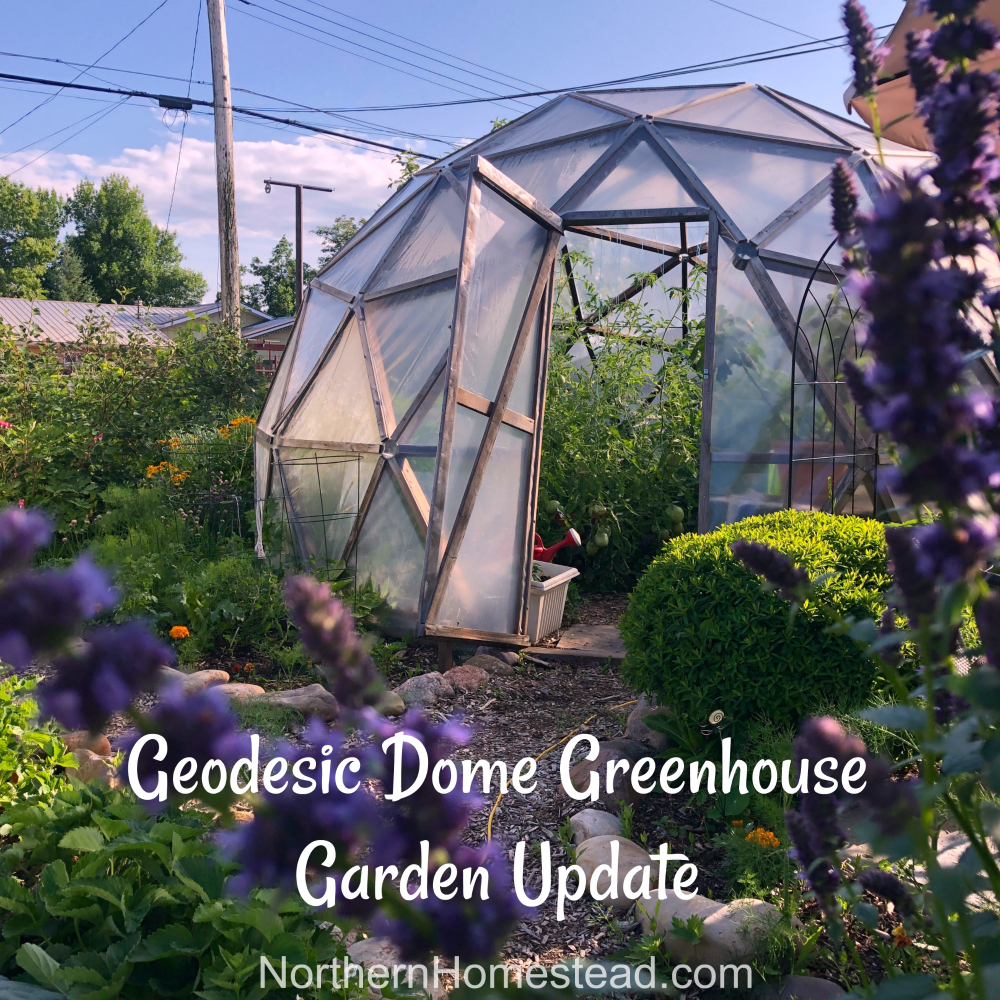

I love it! What an awesome idea. I think it is amazing the creative uses people come up with for items that are typically a one use item. Great job! 🙂 PINNING
~Lorelai
Yep, that’s my hubby, he comes up with all kind of awesome ideas. Thank you for pinning!
I thought I had seen it all! You and your husband’s creativity never ceases to amaze me. Love it!
Thank you, we still have lots of ideas we have not shared yet ;).
This is awesome. To me this is so cool because I used to scrap used metal for income. When my homestead was in transition it reminds me of why I started and good old no how keep it up
Very creative thinking! I would love to see the step by step tutorial. I know you guys really miss your Geo Dome. Pinning to my Sustainability board.
Yes, we do miss the dome. But the “new” productive garage is coming along nicely. Still a long way to go and to learn.
Now this is ingenious! I never would have thought about doing this! Sharing with my dad – he’s all about mechanics and building inventions!
Thank you for sharing. The post is written for people like your dad ;).
Now that, is one of the most creative ideas I’ve seen in a long time. I love it!!
Thank you Jan, and welcome here.
This was wonderful, Anna! I totally pinned this one for my husband to figure out. Ha!
You are welcome, hope he gets inspired ;).
I have been telling everyone I know how awesome your greenhouse is. Is it possible to be more than awesome? If so, I think you’ve reached the next level with this addition. Thank you for sharing on Green Thumb Thursday.
You make me smile :). Thank you!
From my experience with thermal mass projects, efficiency is the key. I would think that using 2 inch insulation foam sheets and burying tank in the earth would help retain either cool or warmth depending on what you wanted.
Would placing the radiator on the apex of the ceiling help get more heat in the summer out and placing it near the bottom in the winter put heat back in? Now I will have to play with a dual radiator idea that I can use to siphon off heat from one and disperse heat from the other.
Sounds interesting. Good luck and happy gardening!
Interesting. I’m also looking at using old car radiators in a different set up for our greenhouse. Our allotment has no power, so planning to embed radiators in cement slab down centre of greenhouse. No fluid, going to blow hot daytime air from roof apex through the radiator heatsink ( solar powered computer fans), with the heat released during darkness.
Sounds like a good idea. Just for your consideration the heat capacity of water is about 5.5 times higher than of concrete. Heat capacity gauges the ability of the medium to retain heat.
Did think of water but old rads may of course leak, but they would be more accessible in a water bath than cement, may return to that, thanks. Have you thought of enclosing your rad in a box with a perspex front, that would really heat it.
have you considered using your water tank for hot composting in the winter? perhaps this will raise the temps enough to extend the growing season.
Hot composting is very interesting, and we are considering to do it in our next Geodesic Dome greenhouse. Our winters would probably be to cold, but to start early in spring would be great. Great suggestion!
How much power does the radiator draw? Do you need AC or DC? What about solar panels?
Thanks
You need 6-12V DC for the radiator fans if you want to vary the air movement. I never ran them on full speed, the draw will depend on the voltage you use. Solar panels would work during the day, you might want to connect a battery for the night time to keep the greenhouse warm at night.
One thing you may consider adding to your current design is a water heater element for your water tank that is driven by a rooftop mounted windmill. This is assuming you have adequate wind in your area. Heated water is a great way to store renewable energy.
What a great idea. I’m a huge repurposer myself. I can definitely see this set up with a DIY solar set-up and a single or dual battery bank (depending on the draw). I’ll be featuring you as my favorite on next week’s From the Farm blog hop. Thanks for stopping by the hop!
Thank you Brandon! The possibilities are almost endless if you think outside the box 😉
Absolutely brilliant idea! I’m hoping to get my first greenhouse going this spring…..I should be able to get one of these in by fall. Hopefully!
~Lisa M
How exciting to build the first greenhouse, congrats! You will love it! Happy gardening!
Excellent website . I stumbled onto your page ,whilst have a discussion with my 14yr old son on the merits of understanding geometry . He is in an advanced class for his age and this is the current topic. So whilst doing his homework exercise ,he remarked whether he would ever use it in real life. He ws thinking of the futility of some of the advanced level mathematics.
I usually engage him in these matters by showing him , and actually starting a practical project . So I Suggested a geodome as a structure for an aviary ecosystem. Yes he is passionate about the planets life forms and his goal is to be a Vet . So thank you for making this easy for me. I also advocate sustainability and reuse.
How nice, thank you for sharing.
Love this idea!! I want to set up something similar in my greenhouse. Can you tell me more about the water tank under the radiator in the photos? What type of plastic did you use? I want to build something but on a budget unfortunately and would like to see if I can make something for cheaper than the cost of a stock tank because I have quite the supply of wood.
Thanks
– Justin
We used vapor 6 mil barrier plastic film.
I’ve used a homemade a solar collector to heat my outdoor fish pond AP system in the past. It worked well enough to raise the pond temp, but had to make sure the timer was off (or just use a solar pump) to ensure it wasn’t pumping at night as then it would just vent the heat. However, in a greenhouse venting heat at night is the whole point.
How did you clean the radiator and verify it was safe to use?
I just cleaned it with water.
Back in the early 80’s in Montana we used a radiator to cool our home. Huge waste of water as we ran tap water through it with a fan behind it…not something I would do anymore, and then piped the waste to our garden for irrigation. It worked better than any air conditioner I’ve ever been around. Radiators make great heat exchangers.
What did you use for the pump? I’ve tried a fuel pump from the same car I got the rad from but it working after only one day. Please let me know ASAP. Thanks
You do not need a special pump, it just has to be submersible and be able to pump the water as high as your radiator is. This one here is a good pump that we use: http://esau.towergarden.com/shop/submersible-pump
Very interested in the car radiator idea. I have built a geodesic dome and I have a 700 liter sump tank as we were going to build an aquaponics system.
Great work
We live in Manitoba, Canada and have been having such a nightmare of a time with keeping a greenhouse up with the super high winds in April and May. Just lost all our cuke babies to the wind last night, when the unexpected high winds blew down the structure we had just transplanted them into yesterday. This Geo design is AWESOME… I think we will finally be able to build a greenhouse that will be able to withstand the winds, and allow us to get our plants out early enough to get some real production going… Thanks so much for sharing this with all of us! Crystal 🙂
You are welcome, hope it works great for you! There is something special about a geodesic dome greenhouse, not just the stability!
Hi, Anna and Jakob
Brilliant idea!
I’m working in a community garden in London (UK) And I’m planning to do something similar but using the radiator with the original car fan (12v) do you see any problem to run this type of fan 24/7? Any thoughts?
Thanks a lot
It really helped when you provided answers to commonly asked questions regarding auto heating and cooling system. And also, the video explaining on the radiator for a better air circulation status. This video tutorial is really useful and informative.
That is a fantastic idea! Heating our greenhouse using thermal mass has always been our practice but I’ve never thought of or even heard of this but what a great idea. Thanks for sharing!
Hi I read your comment about radiator freezing. If you mount it sideways or so the radiation drains when pump is not running. Then fit a thermostat on the radiator that protects it against freezing. I would suggest set at 40F. That would protect the radiator. Also insulating the tank may be help it not loose heat until the internal temp drops to the protect level.
I have been planning on including a radiator to my greenhouse too. My greenhouse is going to be much like those built by Russell Finch in his Greenhouse in the snow designs. You can see Russell and his design on YouTube. Russell uses tubes that pull air from tubes that are underground. The other thing I hope to be doing is to use what is called a “Jean Pain” compost stack to heat up PEX plumbing that will carry the hot water inside to the radiator ( read the book by Galen Brown.called The Compost Powered Water Heater”. To insulate the PEX I will use Aerogel insulation. I will not put water into my system. Instead I will use glycol alcohol (antifreeze). If all that is not enough there is also plans out there for parabolic solar hot water heaters that can be built and hooked up to the PEX. My brother is building a simple solar collector box with recycled materials like soda cans, pallets, a small fan from an old computer that recycling centers sometimes have and black paint ( we have a solid waste management district that takes in old paint and gives out for free ) and all the plexiglass that will be left over after the pandemic. These solar can collector boxes can be set up under a window much like a window air conditioner in a sunny location and will add heat to his sunroom. I like the compost idea best because it can run for two years straight sun or not. A solar panel or electrical will be needed to run the fans and led lighting which would be needed if the Greenhouse is to run year around. One last thing is to build the greenhouse partially into the ground and adding the tubes that Russell Finch uses. You can bump up your greenhouse use quite a bit with some or all of these changes! Let me know if you do! This was my dream. I am terminally ill with cancer in a pandemic and can not even get the shot! Sometimes you just have to help as many as you can make dreams happen even if you can not reach yours.
Thank you for sharing all your great findings. You got some great tips there. Wishing you health and hopefully a great growing season.
Hi! This is such a brilliant idea. I’m shocked it’s not adopted more widely.
Did you experiment with how much water is necessary? I’m wondering if i can get away with 50 gallons for a greenhouse avout the same size as yours.
Thanks so much for sharing!!
I haven’t experimented with how much water is necessary, but you could certainly try with 50 gallons.